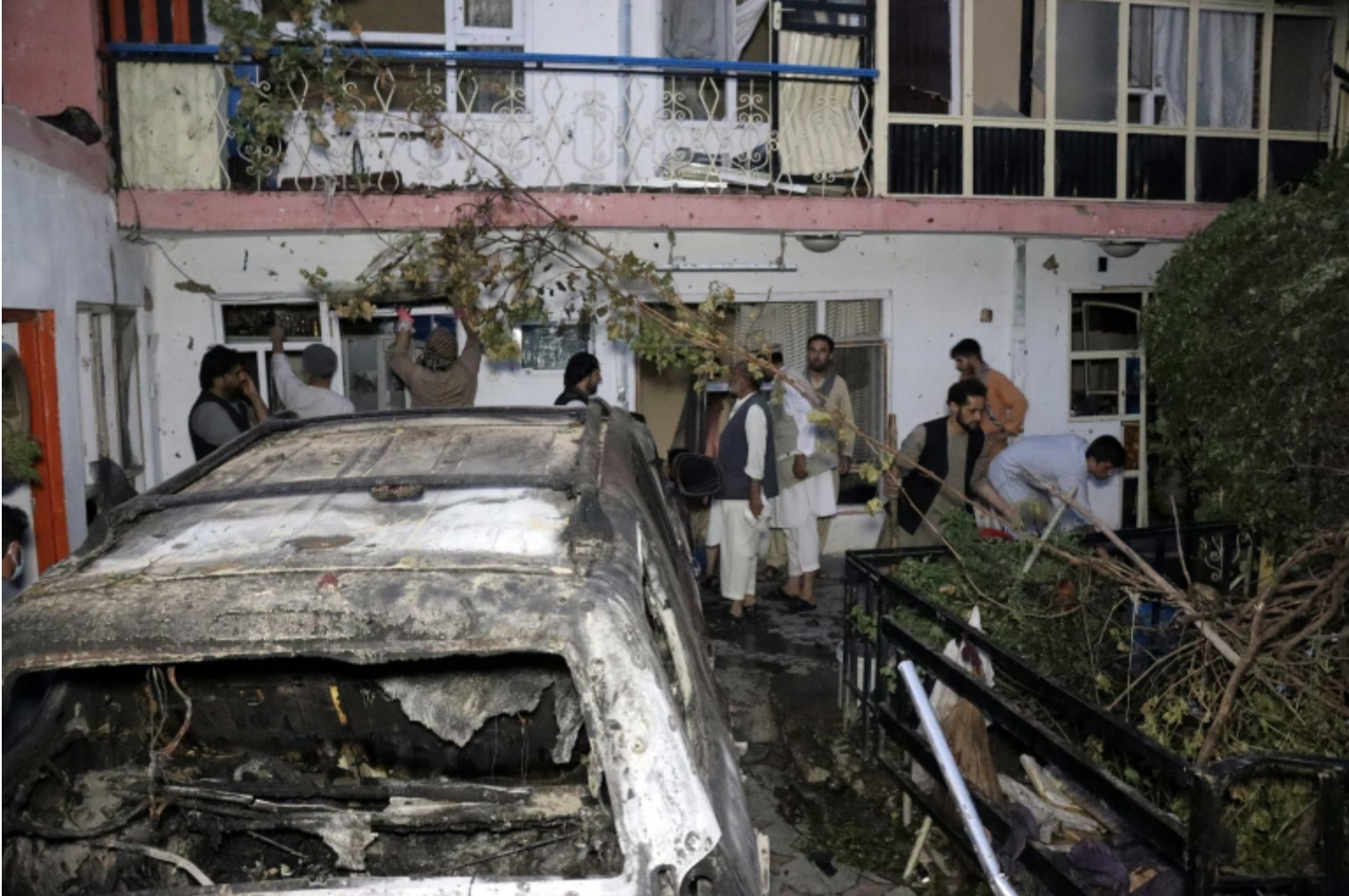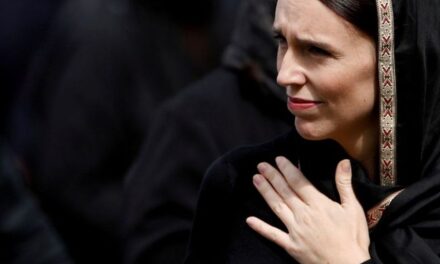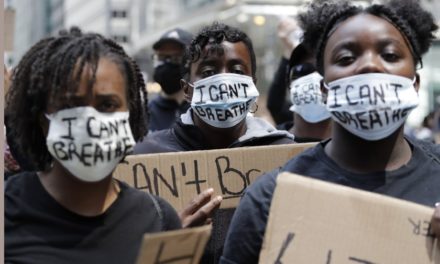In this Aug. 29, 2021 file photo, Afghans are seen as they inspect a house damaged by a US drone strike which killed 10 members of a family, including many children, in Kabul, Afghanistan [AP Photo/Khwaja Tawfiq Sediqi, File]
One recurring theme in the media coverage of the US pullout from Afghanistan is that after 20 years, trillions of dollars, and thousands of lives lost, we left the country in the same broken state it was before we arrived. “We accomplished nothing,” goes the pundit refrain. But that is wrong. We invaded Afghanistan “to prevent it from becoming a breeding ground for terrorists” – and we did not leave it as it was. We left it worse. Far worse.
As a survivor of genocide and an academic studying the ways that education can resuscitate broken countries and people, I have repeatedly seen how even the most tolerant Muslims can end up being radicalized under the right set of conditions.
I have studied radicalization trends among my own people, Bosniaks, for years. Bosnian Muslims have long been considered the world’s most tolerant Muslim community. But today, a growing number of Bosniaks have adopted Salafism – a rigid ideological thread within Islam – and hold hardline beliefs that are in line with those of al-Qaeda, ISIL (ISIS) or Boko Haram. Why is this happening?
Radicalization is the result of a desperate and misguided search for a pathway to empowerment by people starving for a sense of belonging, recognition, and basic respect.
In 1991, Serb leader Radovan Karadzic, who has since been convicted of genocide by the International Criminal Tribunal for Former Yugoslavia, warned Bosniaks: “Do not think that you will not take Bosnia and Herzegovina to hell and the Muslim people maybe into extinction, because if there is a war, the Muslim people will not be able to defend themselves.”
And he was right. Bosniaks went to hell and back from 1992 through the end of 1995.
We had no weapons to defend ourselves as Serbian forces invaded and, assisted by local Serbs, swiftly occupied much of the country. The US and Europe chose to watch silently as genocide, war crimes and mass rapes against Bosniaks unfolded before their eyes. They sat idly by even as Serb forces loaded Bosniaks in Srebrenica onto buses on a hot summer day in 1995 and took them to the sites of their executions. After thousands of deaths, many more rapes and months of unbearable suffering, NATO finally moved to end the conflict. But then, it gave half of the country – including Srebrenica – to the Serbs, who had either committed genocide or silently watched it happen.
The genocide, as well as the decision to reward its perpetrators with territory, has had a radicalizing effect on some Bosniaks. And my research showed me that this trend continues to this day.
If Bosnian Muslims, historically known for their tolerance and acceptance of other cultures and religions, can radicalize, anyone can. Exposure to violence is a critical risk factor for radicalization. Trauma triggers an internal transformation in a person who is desperately looking to make sense of their pain, loss, exclusion, and shock.
I have felt this myself. After I survived a Serb artillery attack on the Blue Bridge in my hometown of Bihac, I saw a UN car approach. I was just 17 years old. I believed they were coming to help. But instead of stopping to help me and others on the bridge, they sped away. At that moment I realized that the world does not really care about “dead Bosniaks sprawled on the streets”. As I tried to help a girl whose face had been blown apart by the blast, I experienced an immediate, uncontrollable surge of anger. In the midst of that terror and trauma, I felt an overpowering urge to do something – anything – to make sure this would never happen again to me or the people I loved. Horrific thoughts previously completely unknown to me flooded into my head, unbidden, summoned by the violence I had just seen. What if we responded to our killers by slaughtering their innocent children? Would that be justified? Would that stop them from committing genocide against us?
I could have hated every Serb, every Christian, every American, because they contributed to my trauma. But I did not end up taking a violent path. Neither did the overwhelming number of Bosniaks who suffered the trauma of genocide, though a few did. I was able to choose a different path out of trauma not because of something intrinsic within myself, but because I was lucky enough to have educational opportunities and strong family ties. In 1996, after surviving ethnic cleansing and more than 1,000 days under Serb siege, I emigrated to the US and had the opportunity to continue my studies freely. My parents, teachers and mentors instilled moral resilience in me and provided me with opportunities for engagement – all protective factors against radicalization. That safety net caught me and put me on a nonviolent path. But what if I was a teen with no choice, no support, no viable path out of trauma? I could have been radicalized too.
Afghans – or anyone for that matter – are no different from Bosniaks. Every human who has been exposed to violence faces the risk of radicalization under certain conditions.
Today, the conditions in Afghanistan check every box on the radicalization checklist: Afghans have suffered trauma and violence. They feel betrayed by an external force that allegedly came to “help” them, but ended up leaving them worse off. They live in economic deprivation with one million children at risk of starvation. They also have very limited educational opportunities – millions of Afghan children are unable to go to school and have little hope for the future.
Since 2001, tens of thousands of Afghan civilians perished as a result of US drone strikes. According to the international NGO Save the Children, almost 33,000 children have been killed and maimed in Afghanistan during the past 20 years, an average of one child every five hours. As recently as August this year, a US air attack – launched in response to the bombing of the Islamic State Khorasan Province, ISKP (ISIS-K) at the Kabul airport that killed 182 people – killed 10 members of a family, seven of them children. Later, it was revealed that the family that was attacked had no ties to the “terror” group.
In the eyes of Afghans, these victims are not just statistics, and cannot be written off as “collateral damage”. They are fathers, mothers, sons and daughters murdered by American bombs, or because of the American presence. Each of those killings is a scar on an Afghan heart, and in part explains why it was not difficult for the Taliban to take control of the country.
Afghans never wanted us there in the first place. For them, the US has always been just another empire in the long line of many who brought violence and imposed corrupt leaders on them.
In my research, I have seen over and over again how when feeling threatened by an external force, both individuals and nations turn inward to protect themselves and demonize the outward “other.” In that process, they often radicalize. America has been that outward “other” for Afghans for decades.
The US first interfered during a hopeful period for Afghanistan, when the Soviet-influenced Communist Party centralized power in 1978 and started advancing the rights of women, increasing literacy, and pushing for modernization. Most rural areas, however, remained illiterate and against secularism. America brought this uneducated rural population together with religious fighters to disrupt and destabilize Afghanistan – all to win its proxy war against the Soviets at the expense of Afghan lives and futures. By the mid-1990s, the US got what it wanted – at least in part. The Soviets left, but the Taliban emerged as the strongest force conditioned for more violence. In late 2001, in the aftermath of the 9/11 attacks, the US intervened in Afghanistan once again, this time to topple the Taliban.
After 20 years of occupation, the US has left Afghanistan earlier this year. And Afghans are facing the risk of being radicalized once again, perhaps even more so than they were pre-2001. This is because the US did not create a situation in Afghanistan where people can get the support they need to find a constructive path out of their trauma – a trauma the US played an important if not primary role in creating. Most Afghan youths today do not have the opportunities I had to process my trauma after the Bosnian genocide. They have nothing to hold on to, no support network, and no hope for the future.
In the last 20 years, the US spent trillions on its military activities in Afghanistan but failed to intelligently invest in education and mental health services in the country. It failed to center its efforts on building robust physical infrastructure, a prosperous economy to allow Afghans to benefit from their immense lithium reserves or a functional legal system to lessen corruption in one of the poorest and most corrupt countries in the world.
We invaded Afghanistan as part of our so-called “war on terror”, but ended up making the country an even more fertile breeding ground for “terrorists”.
When people have no opportunities to change their desperate conditions, they morally disengage from their own communities. Their anger and resentment towards a force they hold directly responsible for their abject condition allows them to absolve themselves from acts they once believed reprehensible, justifying torture or murder if it serves a higher purpose. To morally disengage is to accept killing as a moral and viable act – and perhaps as the only act the morally disengaged believe can help them change their condition and protect them, their cohort, and their interests.
No one knows if the next chief hardline group emerging in Afghanistan will be the impetus that sends us back into that country, but it is likely that many state and non-state actors will flock there to advance their agendas. And keep this devastating cycle of violence intact.
If there is one lesson the West should learn from its many interventions in Afghanistan, it is this: people with no hope or support network to help them deal with their trauma become easy targets for radicalization as they desperately search for a path to empowerment, justice and dignity.
In 2001, the year before we invaded, Afghanistan was number 16 on the Global Terrorism Index. After 20 years of occupation, Afghanistan no longer holds that position. It is number one.
And we helped them get there.
The views expressed in this article are the author’s own and do not necessarily reflect Al Jazeera’s editorial stance.














